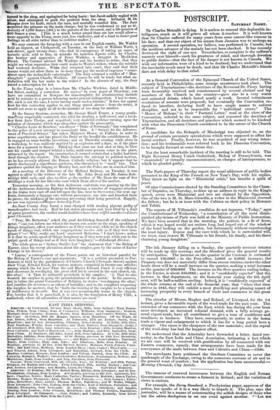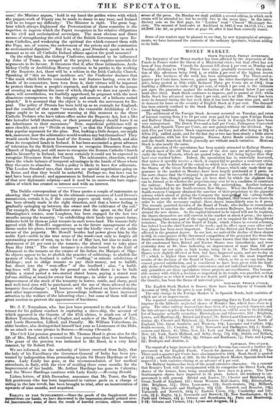The rumour of renewed intercourse between the English and Roman
Governments continues to create a ferment in Ireland; and the variation Ofviews is curious.
For example, the Derry Standani, a Presbyterian paper, approves of the notion but speaks of it in a way likely to impede it. The plan, says the journalist, will be a means of counteracting the selfish designs of those who use the odium theologicum to set one creed against another. " Let VW once,' the Minister argues, hold in my hand the golden wires with which the puppet-work of -Popery can be made to dance to any tune, and Ireland' will be no longer my difficulty.' The Minister is right. The great bugbear which always frightened the Protestantism of these countries is the impeeiwn in inzperio which the Papist recognizes in his relative obligations to his civil and ecclesiastical sovereigns. The most obvious and direct means of strengthening the civil hold of the British Government upon Roman Catholics, and weakening the spiritual ties which connect them with the Pope, are, of course, the endowment of the priests and the nomination to ecclesiastical dignities." But if so, why, good Standard, speak in such a manner as to set all Catholic Ireland aflame against the good measure?
, On the other hand, the Galway Vindicator, understood to be influenced
• by John of Tuam, is enraged at the project; but supplies materials for arguments in its favour. It threatens that if, after these intimations, Archbishop Crolly or Archbishop Murray continue to be parties to the working of the Bequests Act, there will be a schism in the Irish Catholic Church. Speaking of "this no longer insidious act," the Vindicator declares that *" the mask which hitherto concealed its real features having, even at the hands of its concoctors, been torn from it, their virtues will be impotent -to protect them from a people's reproach, and their conduct be the means • of creating an agitation the issue of which, though we dare not openly declare, will nevertheless, we fearfully apprehend, be pregnant with the most disastrous consequences to the integrity and oneness of a hitherto united -church." It is assumed that the object is to crush the movement for Repeal. The policy of Prussia has been held up as an example for England; and the conduct of that state "towards the venerable Archbishop of Cologne ought to be an opportune warning at this moment to the three Catholic Prelates who have taken office under the Bequests Act, lest a like fate hereafter befall themselves, or their present pliancy should leave it as -an inheritance to their successors." Now, superficial politicians will at once chuckle, and cry "Divide et impera"; so that the Vindicator suggests that popitlar argument for the plan. But, looking a little deeper, one might 4ok, moreover, how the schismatics would weaken any but themselves? They would secede from the great head of the Roman Catholic Church, and also from its recognized heads in Ireland. It has been accounted a great advance -of toleration for the British Government to recognize Dissenters from the Church of England, and still more to recognize the Roman Catholic Church ,and its hierarchy in Ireland; but most certainly it could not be expected to recognize Dissenters from that Church. The schismatics, therefore, would leave the whole balance of temporal advantages in the hands of those whom they threaten to abandon. Such a policy is likely to have few adherents. The London Standard says, that there are no special negotiations going on in Rome, and that they would be unlawful. Perhaps so; but laws can be -and have been altered; and appearances in Ireland seem to show the policy -of that new diplomatic relation—and it need be no more—the bare supposition of which has created so intense and wide an interest.























































 Previous page
Previous page